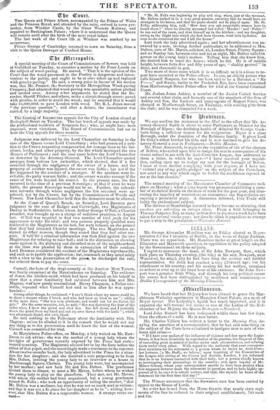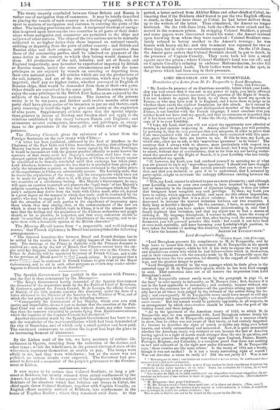Stlisteilanrous.
We have heard that her Majesty has been pleased to grant the Mar- chioness Wellesley apartments in Hampton Court Palace, as a mark of Royal favour. Her Ladyship's health has much improved, and it is expected she will resume her duties as one of the Ladies of the Bed- chamber of her Majesty the Queen Dowager.—Standurd.
Lord John Russell has been indisposed within these last few days, from the effects of a cold. He is now better. •
Mr. Charles Villiers has written a letter to the Morning Post, de- nying the assertion of a correspondent, that he had said something on the subject of the Corn-laws calculated to instigate men to acts of vio- lence and crime- " If I have ever spoken of the influence of violence and fear upon the Legis- lature, it has been invariably in reprobation of its practice, too frequent of late, of conceding great measures of justice under such circumstances, and refusing them under every other. With regard to the authority that your correspon- dent mentions for his statement in a person whom he styles an Anti-Corn- law lecturer, [a Mr. Duffy, we believe] upon inquiring of the Committee of the League now sitting at the Crown and Anchor, London, I am informed
i
that he is no lecturer connected with their body, but a person chiefly known as interrupting their proceedings in the country; and, upon inquiry of Mr. Milner Gibson, whom your correspondent asserts to have been present when this supposed lecturer made the statement in question, and to have highly ap- proved of it, he says it is utterly untrue, and that, like myself, he hears of the statement for the first time this day !"
The Witness announces that the Stewarton case has been carried by appeal to the House of Lords. • .
An order has issued from the Horse Guards that nearly sixty regi- ments of the line be reduced to their original establishment, 740 rank and file.
The treaty recently concluded between Great Britain and Russia is rather one of navigation than of commerce. It may be briefly described
as placing the vessels of each country on a footing of equality, with re-
spect to matters of navigation and customs, in entering the ports of the other. The leading provisions are these. A reciprocal freedom of naviga- tion is agreed upon between the two countries in all parts of their domi- nions where navigation and commerce are permitted to the ships and subjects of other nations. The ships of the two nations are to be mutually subjected to no higher duties than those imposed on national vessels, entering or departing from the ports of either country : and British and Russian ships and their cargoes, arriving from other countries than those of the contracting parties, shall be admitted on payment of the same duties as the country to which they belong would demand for them. All productions of the soil, industry, and art of Russia and England respectively, may hereafter be exported or imported by British or Russian vessels, under the same circumstances and with the same privileges as are enjoyed by vessels on entering or departing from their own national ports. All articles which are not the productions of the soil, industry, and art of the two countries, which may be legally imported, shall pay no higher duties, whether conveyed in English or Russian ships, than would be demanded from them at their own ports. Other details are conceived in the same spirit. Russian commerce is to enjoy the same privileges in the British East Indies as are enjoyed by the subjects of the most favoured nations. The duration of the present treaty is to be ten years, and further until twelve months after each party shall have given notice of its intention to put an end thereto, each part reserving to itself the right to give such notice at the expiration of nine years. Supplementary articles agree that the special stipula- tions granted in favour of Norway and Sweden shall not apply to the relations established by this treaty between Russia and England ; and enumerate several exemptions, immunities, and privileges, as excep- tions to the provisions of the treaty, all of which are of trifling im- portance.
The Morning Chronicle gives the substance of a letter from the Foreign Secretary on the new treaty with China— "A letter has been published, addressed by the Earl of Aberdeen to the Chairman of the East India and China Association, stating, that although her Majesty has been .pleased to ratify the treaty signed by Sir Henry Pottinger, it would be inconsistent with the general practice officially to make known the contents of that treaty until her Majesty's ratification shall have been ex- changed against the ratification of the Emperor of China, as the treaty cannot be considered to be formally concluded until that exchange has taken place. Lord Aberdeen, however, regrets the less that he is precluded from giving offi- cially the information required, as the accounts contained in the public prints of the negotiations in China are substantially correct. His Lordship adds, that he trusts the stipulations of the treaty, and the arrangements which have yet to be made for giving full effect to it, will place the intercourse between the two countries on a satisfactory footing. Her Majesty's Government, he says, will spare no exertion to protect and promote the ' legal trade' of her Majesty's subjects resorting to China ; but they feel that the advantages which her Ma- jesty's subjects may derive from the trade with China must, after all, depend in a great degree on the manner in which that trade shall be conducted by the parties who may be engaged in it. And her Majesty's Government, therefore, call the attention of all such parties to the expediency of impressing upon those whom they may employ, that, at the commencement of the new era which is about to open to British trade in China, it is of the utmost import- ance that the feelings and the prejudices of the Chinese authorities and people
should, as far as possible, be respected, and that every endeavour should be made to conciliate the good-will of the inhabitants of the country, and to in- spire them with a favourable opinion of the British character.'"
The Morning Herald learns from " a respectable and well-informed source," that French diplomacy in Brazil has accomplished the following arrangements- " The disputed boundary-line between Brazil and French Guiana has to be settled by the cession to France of eighty leagues of the Brazilian terri- tory. The marriage of the Prince de Joinville with the Princess Januaria is resolved on ; and, as by the law of Brazil, that Princess cannot leave the em- pire until her Imperial brother shall have issue of his own to the Crown, the Prince de Joinville will be appointed Governor of French if-v.:21a, and reside in the province of Brazil near" thilt french colony. It is proposed that a corns a .Liau be stationed in French Guiana to give éclat to the Royal
GOVernment, and to aid in such other purposes as events may render advan- tageous to French interest in South America."
The Spanish Government has yielded in the contest with France ; and the fact is thus announced by the Messager-
" The King's Government having demanded of the Spanish Government the disavowal of the imputation made by the Ex-Political Chief of Barcelona, 31. Gutierrez, against the French Consul, 31. de Lesseps, the official Gazette of Madrid, of the 10th instant, contains this disavowal, under the form of a letter addressed to the Minister of the Interior by the Minister of War, and of which the last paragraph is couched in the following terms-
" Consequently the Government of her Majesty, which ever acts with justice and impartiality, deems it just to declare that the assertion of the Poli- tical Chief was not accurate, and bad not, without doubt, any other founda- tion than the rumours circulated by persons flying from Barcelona—rumours which the inquiries of the Captain-General had dissipated.'"
Another concession made by the Spanish Government has been to re- mit the remainder of the war-contribution which had been demanded of the city of Barcelona, and of which only a small portion had been paid. The continued endeavours to enforce the impost had kept the place in an increasing ferment of discontent.
By the Lisbon mail of the 6th, we have accounts of serious dis- turbances in Oporto, resulting from the collection of the decirua and other taxes ; which the inhabitants, in the present distressed state of the wine-trade, represent themselves as unable to pay. The troops were afraid to act, and they were withdrawn ; but as the cause was not political, no serious results were expected. The Governor had pro- raised to forward a memorial of the people's grievances to the Govern- ment at Lisbon.
It now seems to be certain that Colonel Stoddart, so long a pri- soner at Bokhara, but latterly released from actual confinement by the Ameer, has perished. In consequence of the intelligence which reached Bokhara of the disasters which had befallen our troops in Cabul, the chief again threw Colonel Stoddart, together with Captain Conolly, an English officer recently arrived at Bokhara, into confinement in the house of Topshee Bashee ; where they remained until Juue. At that
period, a letter arrived from Akhbar Khan and other chiefs at Cabul, in. thnating that if the Bokhara chief feared to put the two English officers to death, as they had done those at Cabul, he bad better deliver them up to the writers of the letter. Thus stimulated, the Ameer no longer hesitated. On the 13th June 1842, both the officers were seized and re- moved to the common prison. In stripping Colonel Stoddart, a pencil and some papers were discovered round his waist : the Ameer insisted upon knowing from whom they were received : Colonel Stoddart reso- lutely refused to betray another to the Ameer's revenge : he was beaten with heavy sticks; and this treatment was repeated for two or three days, but in vain—no revelation escaped him. On the 17th June, the Ameer gave orders that Colonel Stoddart should be put to death, in the presence of Captain Conolly. They were both led into a small square near the prison ; where Colonel Stoddart's head was cut off; and on Captain Conolly's refusing to embrace Mahomedanism, he also fell under the headsman's knife. Their bodies were buried on the spot, in the graves which had been dug in their presence.



























 Previous page
Previous page